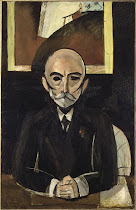Imitate a French scholar. Today, have a carefree personae, take your boldest observation about the world and say it in the most controversial way. Speak in creative riddles and allow your opponents to see what they want in your work.
I like this style of scholarship. Baudrillard claims that 'the Gulf War (1991) did not happen'. Foucault peeks at sinister shadows behind "progress", and Sartre declares that he and his fellow citizens of Paris were free when they were under Nazi rule.
I love being engaged by bold statements. Especially when there's a clever point behind it. Here's the excerpt from Sartre where he points out that freedom, a feeling of deliberate choice, is created in oppressive circumstances.
"WE HAVE NEVER BEEN SO FREE AS UNDER GERMAN OCCUPATION. We had lost every right, and above all the right of speech: we were insulted every day and we had to remain silent; we were deported as laborers, as jews, as political prisoners; everywhere, on the walls, in the newspapers, and on the screen, we saw the foul and listless face which our oppressors wanted to give us. Because of all of this we were free. Since the Nazi venom penetrated our very thoughts, every true thought was a victory. Since an all powerful police tried to force us to be silent, each word became as precious as a declaration of principle. Since we were hounded, every one of our movements had the importance of commitment. The often atrocious circumstances of our struggle had at last put us in a position to live our life without pretences--to live in this torn, unbearable condition which we call the human condition. Exile, captivity, and above all death, which is ably disguised in periods of happiness, became the perpetual object of our concern; we discovered that they were not inevitable accidents or even constant but external threats: they had become our lot, our destiny, the source of our reality as men. Each second we fully realized the meaning of that trite little phrase "All men are mortal."
I don't know who did the translation.
From the essay: La République du Silence (1944)
Sunday, March 8, 2009
Subscribe to:
Post Comments (Atom)




3 comments:
Sounds like an interesting read. I like his denial of the Gulf war, I presume he's making a statement about holocaust deniers? Also interesting point about the German occupation of Paris. Although I would have changed the wording from never more free to never more alive, as I think that explains the point a little better.
"the gulf war did not take place" is not as controversial as it seems. he's making a statement about the technological distancing that happened in earnest in the first gulf war, when the images of the war produced by the US and seen by the west stood in such stark contrast to the reality of the war: gritty, real dead bodies, piled everywhere.
people like to latch on to the title of the book as if he's actually saying something controversial. reading the book though, he's actually making a very obvious kind of claim.
Eric
Thought-provoking guess. But I would say that Baudrillard's philosophical "thing" is authenticity and simulation.
Your rewording of Sartre is greater in comprehension but lesser in captivation. Funny how I've put those as opposite poles.
everyoneisdoomed
What I love/hate about these thinkers is that they dress reasonable claims in provocative statements. I find, in their works, that they have an aversion to stating the obvious and prefer to state it in confusing, exaggerated language, forcing more interpretation than understanding.
As if they have a clear photo of their idea but choose to show a sketch they drew with their eyes closed.
Post a Comment